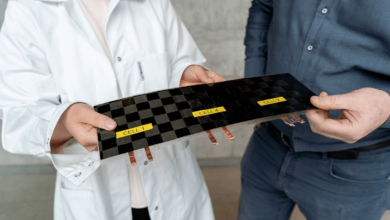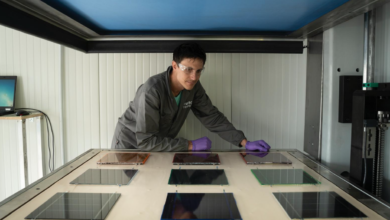An exceptional solar absorber for economical desalination

New advances for economic desalination
(sustainabilityenvironment.com) – The new and important contribution to economic desalination through evaporation comes from Italian-Swedish research, led by Ca’ Foscari University of Venice. The group has developed a new selective solar absorber, a material capable of completely absorbing solar radiation, avoiding infrared emission, and accumulating heat.
“The main novelty of our research – explains Elisa Moretti, professor of Inorganic Chemistry at Ca’ Foscari – is to have created an extremely simple system compared to other systems for the evaporation of water through sunlight, thanks to the light absorption and water transport features, which make the new material a “sponge” able to warm up very quickly and keep its temperature high“.
The solar evaporative desalination
Evaporative desalination is one of the most “simple” procedures for obtaining drinking water. It heats the water to turn it into steam, separating it from the salt. Then the steam is condensed to get fresh water. If the process uses the sun’s energy, it is possible to make it economical and self-sufficient. Several black-absorbed materials have been developed to improve efficiency over the years that can make the most of solar energy without the need for concentrators. The drawback? Surface temperatures remain below 85 ºC due to excessive thermal re-emission into the Middle Infrared (IR) region. Research has focused on selective solar absorbers to avoid this heat loss. These compounds absorb only the desired wavelength, reflecting unwanted ones, and are characterized by low emission in the region of the medium IR.
This is where the new Italian-Swedish research comes in. The group of scientists and scientists from Ca’ Foscari University of Venice, Luleå University of Technology, National Research Council and Linköping University, has created a new highly efficient selective absorber.
The new selective solar absorber
“The new material is characterized by a high porosity and special electronic properties, thanks to which it can absorb the totality of solar radiation, and at the same time not disperse the accumulated heat”, explains Alberto Vomiero, Professor of Materials Science at Ca’ Foscari. “As a result, the surface area exceeds 100 ºC after only four minutes of sunlight“. For accuracy a thin film of the new absorb shows a record surface temperature of 101.7°C under lighting at 1 sun.
The new material, consisting of cobalt and antimony, was tested in a solar evaporation desalination system using artificial light. The test showed excellent performance and “a surface temperature of 50ºC in contact with water“, added Vomiero. The result can contribute to the development of new systems of economic desalination and low environmental impact, in arid areas or with a lack of drinking water. But it also appears useful for the realization of ultra-hot surfaces in areas with high insolation. “This new material – the team stresses – can make an important contribution to the achievement of the Sustainable Development Goals defined by the United Nations Organization, in particular regarding the sixth objective Clean water and sanitation“. The research was published in Nature Communications.





